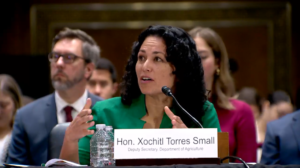U.S. agribusiness Cargill will permanently close its beef processing facility in Milwaukee, Wisconsin, and eliminate 221 jobs, according to a filing with the state, the latest U.S. beef plant to…
Market Relief Needed to Supplement Farm Bill Extension, Senators Say
Progressive Farmer’s Chris Clayton reported Wednesday that “as Congress looks to craft a disaster package, Republican senators are making the case that disaster aid for farmers should be broader than just those producers hit by hurricanes this fall and include ‘market-related disasters.’”
“The U.S. Senate Appropriations Committee held a hearing Wednesday with officials from multiple federal agencies dealing with disasters,” Clayton reported. “The hearing comes just days after the White House proposed a nearly $100 billion disaster package that includes $21 billion in aid for farmers and ranchers.”
“Senators from Georgia and North Carolina testified about the devastation facing their farmers after Hurricanes Helene and Milton hit those states this fall. Sen. Jon Ossoff, D-Ga., said Georgia farmers are in ‘acute distress.’ Winds destroyed fall crops, wiped out roughly 48,000 acres of pecans, destroyed nearly 300 poultry barns and damaged 1.5 million acres of timber,” Clayton reported.

“Beyond those disasters, however, senators highlighted financial losses facing row-crop farmers in their states,” Clayton reported. “Sen. Cindy Hyde-Smith, R-Miss., said there is a ‘looming farm crisis’ in the country and called on Congress to provide aid for ‘all types of disasters’ as well as ‘market-related disasters.’ Hyde-Smith said farmers are in a financially precarious position because lenders are saying they won’t be able to provide financing to farmers unless some financial relief is provided.”
“‘We need to be focusing on market disaster as well, which doesn’t seem to be getting the proper attention,’ Hyde-Smith said,” according to Clayton’s reporting.
What Could Be In Market Relief Support?
Agri-Pulse’s Philip Brasher reported Wednesday that “the method for compensating farmers for the downturn in markets is still debated, although one idea under discussion, according to a senior Hill aide, is to increase commodity program reference prices. Another is to provide reimbursement for crop insurance premiums.”
“The goal, this aide said, is to craft the ‘extension-plus’ package in such a way that it provides immediate assistance to farmers as well as some assurance to lenders and farmers going into the 2025 planting season,” Brasher reported. “‘We need a situation where you provide some economic assistance for this terrible year we’ve had this year. And then also looking forward, we need to be in a situation where we increase the safety nets so that farmers will be able to go to their banks and borrow the money they’re going to need,’ the top Republican on the Senate Ag Committee, John Boozman of Arkansas, told Agri-Pulse on Tuesday.”
“The package also could be written in such a way that it provides a permanent increase in funding for commodity programs,” Brasher reported.
“In addition to bolstering commodity programs, lawmakers also have been discussing the possibility of reimbursing crop insurance premiums and providing assistance to crop insurance agents who have seen their commissions slashed in areas with chronic losses,” Brasher reported. “The senior aide said the decision about rolling IRA funding into the bill will have to be made by congressional leadership. Republicans would likely insist on removing the funding’s climate guardrails, but GOP leaders may also want to leave the issue for next Congress when they will control both House and Senate.”
It is absolutely essential that Congress provide emergency disaster assistance to agricultural producers before the end of the year – and this emergency funding must cover both natural and economic disasters hurting American agriculture.https://t.co/MvvjnxmWZ7 pic.twitter.com/NUzC2K0cd0
— U.S. Senator Cindy Hyde-Smith (@SenHydeSmith) November 20, 2024
“The urgency behind the aid package reflects not only the income losses facing farmers this year but also the concern that passing a full farm bill may even be harder to do in 2025 when lawmakers likely would have to score the legislation’s cost off an updated baseline that will take into account the decline in market prices,” Brasher reported. “A new baseline from the Congressional Budget Office could significantly increase the estimated cost of raising reference prices.”
Pieces of Farm Bill Could Be Included In Relief Package
Brasher also reported Wednesday that “leaders of the House and Senate agriculture committees are discussing putting elements of a farm bill in an end-of-the year aid package, including the addition of possible new funding for commodity programs and crop insurance reimbursements.”
“There also are active conversations about potentially rolling in unspent conservation funding from the Inflation Reduction Act to permanently increase the baseline for the Environmental Quality Incentives Program and other programs, according to those familiar with the discussions,” Brasher reported. “About $14 billion in four IRA-funded programs, including EQIP, hasn’t been obligated by USDA, according to congressional staff. Lawmakers also will need to provide funding for a handful of smaller farm bill programs that were left without funding when the latest farm bill extension expired.”





